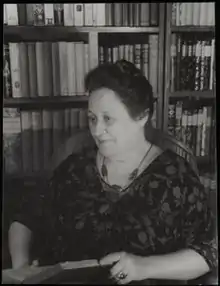Edna Kenton
Edna Kenton (March 17, 1876 – February 28, 1954) was an American writer and literary critic. Kenton is best remembered for her 1928 work The Book of Earths, which collected various unusual and controversial theories about a hollow earth, Atlantis, and similar matters.
Edna Kenton | |
|---|---|
 portrait of Edna Kenton by Carl Van Vechten, 1938 | |
| Born | Edna Baldwin Kenton March 17, 1876 Springfield, Missouri |
| Died | February 28, 1954 (aged 77) |
| Nationality | American |
| Alma mater | Drury College, University of Michigan |
| Occupation | Author, Suffragist |
Notable work | The Book of Earths |
Early life and education
Edna Baldwin Kenton[1] was born in Springfield, Missouri in 1876. Her father, James Edgar Kenton, was a bookkeeper. She attended Drury College,[2] as did her brother Maurice and her sister Mabel,[3] and graduated from the University of Michigan in 1897.[4] She worked in Chicago as a young woman, where she knew Theodore Dreiser.[5]
Career
Kenton's first novel, What Manner of Man (1903), was published while she was still in her twenties.[6] A second, Clem, followed in 1907.[7] Later she concentrated on essays and short stories, as a contributor to Harper's Magazine,[8] Century Magazine,[9] Virginia Quarterly Review,[10] and other periodicals. She also served on the advisory board of The Seven Arts, a short-lived but influential literary magazine.[11] Kenton wrote some important criticism of Henry James, especially her essay "Henry James to the Ruminant Reader" (1924), which introduced a novel reading of The Turn of the Screw.[12][13] Her last publication was an edited collection of Henry James stories.[14]
She is credited with writing the screenplay for the silent film Bondage (1917), directed by Ida May Park and starring Dorothy Phillips.
Kenton was an active suffragist[15] and a charter member of Heterodoxy, a feminist debating club based in Greenwich Village.[16] She served on the executive board of the Provincetown Players, led by fellow Heterodites Eleanor Fitzgerald and Susan Glaspell, and wrote a history of the company, published many years later.[17][18] She also wrote a biography of her ancestor Simon Kenton,[19] and several books based on the letters of Jesuit missionaries in North America.[20][21] But it was The Book of Earths (1928), her collection of esoteric theories about a hollow earth, Atlantis, ancient maps, and similar topics, that found the most enthusiastic and lasting readership, and continues in print.[22]
Personal life
Edna Kenton died in 1954, age 77; author Leon Edel eulogized her in the New York Times.[23] A small collection of her papers is at Columbia University.[24]
References
- "Edna Baldwin Kenton: More Antique Jewelry" Springfield Leader (May 4, 1929): 4. via Newspapers.com

- "Author of Note: Miss Edna Kenton, Formerly of this City, Has a Novel Accepted" Springfield Missouri Republican (July 6, 1902): 7. via Newspapers.com

- "J. E. Kenton Dead" Leader-Democrat (December 4, 1897): 1. via Newspapers.com

- "Book Reviews" The Michigan Alumnus 9(1903): 403.
- Thomas P. Riggio, ed., Theodore Dreiser, Letters to Women: New Letters, Volume 2 (University of Illinois Press 2009): 47. ISBN 9780252091025
- Edna Kenton, What Manner of Man (Bowen-Merrill Company 1903).
- Edna Kenton, Clem (Century Co. 1907).
- Edna Kenton, "The Ladies' Next Step" Harper's Magazine (February 1926).
- Mrs. Francis M. Scott, "The Militant and the Child: Mrs. Francis M. Scott Takes Issue with Miss Edna Kenton on the Burning Question of Feminism--She Declares its Champions are Obsessed with Sex" New York Times (November 16, 1913): X9. via Newspapers.com

- Edna Kenton, "The Case of the American Woman" Virginia Quarterly Review (Summer 1931).
- Alice Corbin Henderson, "The Seven Arts" Poetry 9(4)(January 1917): 214-217.
- Robin P. Hoople, "Literary Lions and Laughing Love: Edna Kenton and Henry James, 1906" Henry James Review 17(1)(1996): 77-84.
- Edward J. Parkinson, The Turn of the Screw: A History of its Critical Interpretations 1898-1979 (PhD diss., St. Louis University 1991).
- Leon Edel, "Tales that James Forgot" New York Times (September 10, 1950): 202.
- "Cite Feminist Words: Suffrage Foes Would Prove 'Free Love' Advocacy" Washington Post (May 25, 1914): 4. via Newspapers.com

- Gerald W. McFarland, Inside Greenwich Village: A New York City Neighborhood, 1898-1918 (University of Massachusetts Press 2005): 243, note 16. ISBN 9781558495029
- Edna Kenton, The Provincetown Players and the Playwrights' Theatre, 1915-1922 (McFarland and Company 2004). ISBN 978-0786417780
- Cheryl Black, "Pioneering Theatre Managers: Edna Kenton and Eleanor Fitzgerald of the Provincetown Players" Journal of American Drama and Theatre (Fall 1997): 40-58.
- John Chamberlain, "Simon Kenton, Kentucky Pioneer: Edna Kenton Writes an Excellent Biography of her Forbear, Who, With Boone and Clark, Helped Create our Middle West" New York Times (April 20, 1930): 55.
- Edna Kenton, The Indians of North America (Harcourt Brace 1927).
- Anne T. Eaton, "Books for Children" (review of Kenton, With Hearts Courageous) New York Times (March 5, 1933): BR18.
- Edna Kenton, The Book of Earths (Kessinger Publishing 2003). ISBN 9780766128569
- Leon Edel, "Edna Kenton" New York Times (April 18, 1954): BR25.
- Edna Kenton Correspondence, 1903-1954 Columbia University Libraries, MS0704.
External links
- Finding aid to Edna Kenton correspondence at Columbia University. Rare Book & Manuscript Library.
- A photograph of Edna Kenton, taken by Carl Van Vechten in 1938; from the Van Vechten papers at Yale University.
